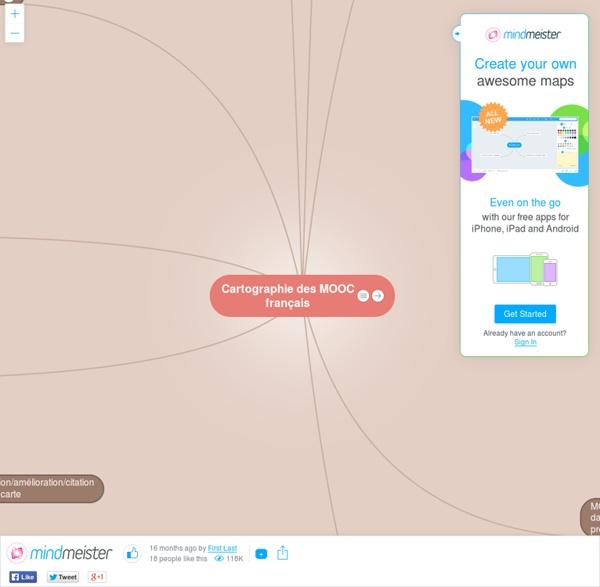



https://www.mindmeister.com/306359951/cartographie-des-mooc-fran-ais
Related: Répertoires de MOOC • formation continueTop universities embrace MOOCs, but opinion is divided Elite universities, especially in America, are engaging enthusiastically in massive open online courses, or MOOCs. “They see opportunities for brand enhancement, pedagogic experimentation, recruitment and business model innovation,” says a review of MOOCs published by the UK government last week. But there are conflicting strands of opinion that are dividing the higher education community. Top institutions are providing brand, content, funding, staff, badging and policy support to MOOCs, and are reporting positively on MOOC experiments, “describing a process of maturing, expansion and deepening,” says the review. “There are dissident voices in the elite institutions, however, and the arguments they are assembling against MOOCs remain strong and vocal.” Smaller or less prestigious institutions have not engaged strongly with MOOCs, the report points out, “either through lack of appetite, lack of capacity, or lack of opportunity.
MOOC DIY Education aux médias et à l’information Guided by EOL, the " DIY MIL " MOOC avatar , the participant is invited to think about the « Do It Yourself » philosophy and Media and Information Literacy. Each time this icon appears in a unit, EOL sails you through a specific MIL spirit. EOL also keeps you company on the social networks @eol_diyemi, and on #DIYMIL and answers on the forums and microblogging tools of the MOOC. The DIY MIL answers to your questions on MIL : Why ? Who ?
Plan du cours Économie du document/web Skip to content Plan du cours Pierre Bénech More Posts Laisser un commentaire MOOC Strategies of the Traditional LMS Providers The other evening, a close friend of ours was discussing a bad experience taking a MOOC on Coursera. Neither the content nor the format of the class was the problem; rather, it was the experience of Coursera’s online platform that left this person wishing that it was delivered via a traditional LMS instead. Since late 2012, there has been conversation about the overlap between the LMS and MOOC platform markets. While most of the edtech community continues to focus on the major MOOC platforms (e.g.: Coursera and EdX), each of the major LMS makers now has a solution for teaching MOOCs as well. Blackboard’s CourseSites has offered “open enrollment” courses since April 2012, the very month Coursera was founded, although the organization’s official press didn’t mention the acronym “MOOC” until early/mid 2013. Instructure launched their own Canvas Network in November of 2012.
Coursera Raises $43m, LMS and MOOC Collision In Learning Platform Market -e-Literate Today Coursera announced their new round of fund raising, as reported at GigaOm: Just last year, online education startup Coursera raised $22 million in venture funding, but the Mountain View-based company is topping up its coffers once again.On Wednesday, the startup said it had raised $43 million in a Series B round of financing from an impressive and interesting group of investors, including education-centric investors GSV Capital and Learn Capital, well-known Russian investor Yuri Milner, the International Finance Corporation (which is the investment arm of the World Bank) and Laureate Education, a for-profit higher education provider formerly known as Sylvan Learning. Besides the size of the funding, what strikes me is that one of the emerging trends is that MOOCs are becoming more and more of a learning platform, adding many of the basic features of an LMS.
Calling an LMS a MOOC will only confuse the learner. Perhaps the Learning Management System (LMS) is not the best of terms to use when seeking to encourage learners to engage with e-learning courses; indeed when we first launched back in 1995 we described our tool as a Training Management System, a phrase still very much in use today. We realised some years ago that even this restricted the vision of what a fully developed training tool could achieve and rebranded our system as "Enable", giving it strong learner focus. In our view the term LMS is possibly guilty of having too much emphasis on management and not enough on learning. Blackboard Pushes LMS Platforms for MOOC Use Distance Learning | News Blackboard Pushes LMS Platforms for MOOC Use By Dian Schaffhauser07/10/13 Blackboard's CourseSites is wooing additional institutions to its free learning management offering to run their massive open online courses (MOOCs). During the company's annual conference it announced that 15 colleges and universities will be trying out their MOOCs through the learning management system (LMS). Under the agreement, according to a statement, the schools retain control of all "current and future revenue associated with MOOCs," whether those are offered for pay or for credit.
Corporate MOOC vs. Your Existing Learning Systems We’re putting together a series of blog posts around the topic of corporate MOOCs. We hope this helps you understand and frame how a corporate MOOC could add value to your business. If you’re interested in learning more, be sure to read our other blogs about corporate MOOCs. You might be wondering why you should consider a corporate MOOC if you already have both training systems and collaboration systems in place. Our answer: “Exactly!” The fact that your systems are separate demonstrates what you just might gain by investing in a corporate MOOC solution.
How are Companies Using MOOCs Today? Two weeks ago, I wrote my first blog post on corporate “massive open online courses,” or MOOCs. I described their origins in higher education and the value that corporations are beginning to achieve by using MOOCs to meet specific business objectives. Over the past few months, my colleagues and I have had dozens of conversations with business and learning leaders, seeking to understand how they are using MOOCs today, what applications they envision for their diverse audiences, and what ideas they have for using them in the future. We’ve learned a lot about MOOC applications in the corporate world, and we’ve identified some key themes: